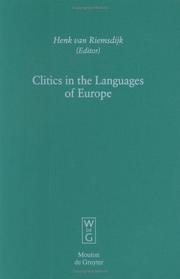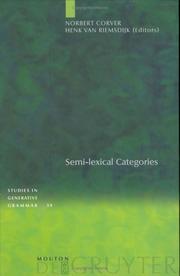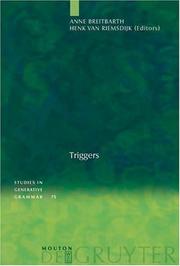| Listing 1 - 10 of 25 | << page >> |
Sort by
|

ISBN: 3110157519 3110804018 Year: 1999 Volume: 20-5 Publisher: Berlin Mouton de Gruyter
Abstract | Keywords | Export | Availability | Bookmark
 Loading...
Loading...Choose an application
- Reference Manager
- EndNote
- RefWorks (Direct export to RefWorks)
Grammar --- Europe --- Council of Europe countries --- Eastern Hemisphere --- Eurasia --- Languages --- -Clitics. --- Clitics. --- Clitics --- Linguistic geography. --- Dialect geography --- Geography, Linguistic --- Language and languages --- Language geography --- Areal linguistics --- Dialectology --- Geography --- TYPOLOGIE (LINGUISTIQUE) --- LANGAGE ET LANGUES --- CLITIQUES --- Langues --- Clitiques
Book
Year: 1976 Publisher: Amsterdam : Universiteit van Amsterdam. Instituut voor algemene taalwetenschap,
Abstract | Keywords | Export | Availability | Bookmark
 Loading...
Loading...Choose an application
- Reference Manager
- EndNote
- RefWorks (Direct export to RefWorks)
Book
Year: 1976 Publisher: Amsterdam
Abstract | Keywords | Export | Availability | Bookmark
 Loading...
Loading...Choose an application
- Reference Manager
- EndNote
- RefWorks (Direct export to RefWorks)
Book
Year: 1981 Publisher: Tilburg Katholieke Hogeschool
Abstract | Keywords | Export | Availability | Bookmark
 Loading...
Loading...Choose an application
- Reference Manager
- EndNote
- RefWorks (Direct export to RefWorks)
Book
Year: 1976 Publisher: Amsterdam Universiteit
Abstract | Keywords | Export | Availability | Bookmark
 Loading...
Loading...Choose an application
- Reference Manager
- EndNote
- RefWorks (Direct export to RefWorks)
Book
Abstract | Keywords | Export | Availability | Bookmark
 Loading...
Loading...Choose an application
- Reference Manager
- EndNote
- RefWorks (Direct export to RefWorks)

ISBN: 3110874008 3110166852 3111786129 9783110874006 9783110166859 9783110166859 Year: 2001 Volume: 59 Publisher: Berlin Mouton de Gruyter
Abstract | Keywords | Export | Availability | Bookmark
 Loading...
Loading...Choose an application
- Reference Manager
- EndNote
- RefWorks (Direct export to RefWorks)
The distinction between functional categories and lexical categories is at the heart of present-day grammatical theory, in theories on language acquisition, code-switching and aphasia. At the same time, it has become clear, however, that there are many lexical items for which it is less easy to decide whether they side with the lexical categories or the functional ones. This book deals with the grammatical behavior of such in- between-categories, which are referred to here as "semi-lexical categories".
Grammar, Comparative and general --- Semantics. --- Function words. --- Syntax. --- Lexicology. Semantics --- Grammar --- -Grammar, Comparative and general --- -Semantics --- Formal semantics --- Semasiology --- Semiology (Semantics) --- Comparative linguistics --- Information theory --- Language and languages --- Lexicology --- Meaning (Psychology) --- Comparative grammar --- Grammar, Philosophical --- Grammar, Universal --- Philosophical grammar --- Linguistics --- Philology --- Function words --- Syntax --- Grammar, Comparative --- Closed-class words (Grammar) --- Empty words (Grammar) --- Form words (Grammar) --- Function words (Grammar) --- Functors (Grammar) --- Grammatical words (Grammar) --- Structural words (Grammar) --- Closed-class words --- Empty words --- Form words --- Functors --- Grammatical words --- Structural words --- Semantics --- Grammar, Comparative and general Syntax

ISBN: 9783110197433 311019743X 9783110181395 3110181398 3110181398 1283396491 9781283396493 9786613396495 6613396494 Year: 2004 Publisher: Berlin Mouton de Gruyter
Abstract | Keywords | Export | Availability | Bookmark
 Loading...
Loading...Choose an application
- Reference Manager
- EndNote
- RefWorks (Direct export to RefWorks)
The concept of 'trigger' is a core concept of Chomsky's Minimalist Program. The idea that certain types of movement are triggered by some property of the target position is at least as old as the notion that the movement of noun phrases to the subject position is triggered by their need to receive nominative case. In more recent versions of syntactic theory, triggering mechanisms are thought to regulate all of movement. Furthermore, a quite narrow range of triggering mechanisms is permitted. As is to be expected, such a restrictive approach meets a variety of difficulties. Specifically, the question is whether all triggering elements required to cover displacement of all kinds in natural language can be independently motivated. Further, how can a trigger theory, which crucially relies on the idea that all movement is obligatory, deal with apparently optional movement processes? Are features an adequate means to express the triggering function in all cases? More radically, are all movement phenomena really the result of the checking of trigger features? And what about apparent triggering factors that are 'external' to syntax such as prosody - can they be captured in a rigid trigger theory? In other words, could certain aspects of triggered movement be due to interface conditions? Such is the range of questions addressed by the fourteen contributions to this book. They cover a considerable range of languages (including Afrikaans, Breton, Bulgarian, Dutch, English, French, German, Gungbe, Hungarian, Italian, Japanese, Kiswahili, Romanian). These papers present materials, both empirical and theoretical, that will not fail to have considerable impact on the further development of the concept of trigger in syntactic theory.
Grammar --- Grammar, Comparative and general --- Linguistics. --- Syntax. --- Syntax
Book
Year: 1983 Publisher: Tilburg Tilburg university. Department of language and literature
Abstract | Keywords | Export | Availability | Bookmark
 Loading...
Loading...Choose an application
- Reference Manager
- EndNote
- RefWorks (Direct export to RefWorks)
Periodical
Year: 1987 Publisher: Dordrecht ; Providence Berlin ; New York Foris Mouton de Gruyter
Abstract | Keywords | Export | Availability | Bookmark
 Loading...
Loading...Choose an application
- Reference Manager
- EndNote
- RefWorks (Direct export to RefWorks)
| Listing 1 - 10 of 25 | << page >> |
Sort by
|

 Search
Search Feedback
Feedback About UniCat
About UniCat  Help
Help News
News